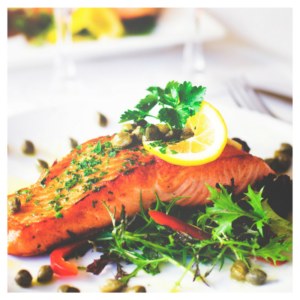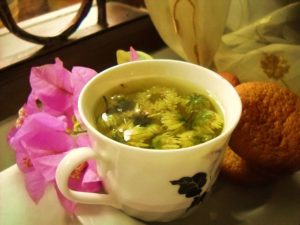Do you know that capers, the tiny little flower buds that many Mediterranean cuisines call for, are not only a great condiment but are extremely good for your gut? They may also be a good remedy during times when the food that you have ingested creates pain in your bowel due to an allergic/inflammatory reaction.
Capers may be small and look insignificant, yet they are flavorful and super phytonutrient dense. They are a great source of the flavonoid compounds rutin and quercetin. As a result, capers have an extremely strong anti-inflammatory effect on our gastrointestinal health. In fact, in a medical journal article published in 2013, researchers compared a set of flavonoids with a drug called “5-aminosalicylate acid”, also known as “5-ASA”. The primary use of 5-ASA is to treat Inflammatory bowel disease (IBD). Rutin exhibits strong anti-inflammatory properties, similar to those of 5-ASA drug in the experiment.
In another clinical study, the researchers tested the effects of using caper extract on gastric cancer cells. The experiment results showed that capers were able to induce cancer cell death in a dose dependent manner while being completely harmless to the internal organ. Many other studies have been carried out over the recent few years on the effects of using bioactive substances such as rutin on various types of cancers. One experiment published in late 2016 revealed that Rutin was able to restrict migration of 2 types of colon cancer and 1 type of lung cancer. This indicated that rutin may have potential as an anti-cancer agent.
Rutin and Chinese Medicinal Herb Sophora Japonica (Huai Hua Mi, 槐花米)
Since we have been talking about rutin and its anti-inflammatory effect, I would like to introduce a Chinese Medicinal herb called Sophora Japonica to those who are interested in learning more about rutin and the use of this herb Sophora Japonica to treat symptoms due to hypertension.
Sophora Japonica, in Chinese Pinyin, is called “Huai Hua Mi” 槐花米. It is the dried flower buds of the pagoda tree. This tree is so hardy. You can find it in literally every city in China and its benefits go far beyond its medicinal use. The flowers are commonly used for dye; the seeds are harvested for industrial oil; the fruits contain rich bioactive ingredients used to make drugs; the wood is so solid and unyielding, that it is frequently used for timber, construction material and furniture. And of course, the dried flower buds, Sophora Japonica, are chosen by chinese herbalists for their medicinal use.
Sophora Japonica contains a very high amount of rutin. In fact, many non-citrus sources of rutin supplements are extracted and derived from Sophora Japonica (“Huai Hua Mi”). Due to its unique combination of bioactive ingredients (most of them are anti-inflammatory), Sophora Japonica is one of the most important Chinese medicinal herbs used to treat bleeding due to “heat and toxin accumulation” (according to our Chinese medical diagnoses).
Sophora Japonica, when combined with other appropriate medicinal herbs, is especially useful to treat bleeding in the lower burner (according to the ancient medical text books) with symptoms such as bloody stool, bloody urination, incessant menstrual bleeding or bleeding between menstrual cycles. Although Japonica is great to control bleeding in the lower part of the body, one special use of Sophora Japonica is to treat symptoms associated with “liver heat” and “rising of liver yang”, according to our TCM diagnosis. These symptoms are: headaches, red eyes, nosebleed, dizziness and vertigo, dry mouth and a constant feeling of irritation due to heat rising up to the upper body. To treat these types of issues, Sophora Japonica herb is commonly used to make tea in our Chinese culture. (I have included a simple recipe here in case you may find it useful.)
Sophora Japonica Green Tea with Chrysanthemum Recipe:
Ingredients:
- Sophora Japonica 3g
- Green Tea 3g
- Dried Chrysanthemum Flower 3g
- Water 250 ml
Directions:
- Rinse both Sophora Japonica and Dried Chrysanthemum flower with water to remove any residual dirt from the surface
- In a pot, add water and bring it to a boil. Then, add all ingredients and cook for 2 minute. Cover with a lid. Let it stand for 10 minutes.
- Filter and save the herb residue. Drink tea at room temperature. Reuse the herb residue to make another cup of tea later in the day.
Since we are talking about drinking tea, perhaps we should also talk about cooking and eating. If you are someone like me who enjoys getting busy in the kitchen, I have included one of my salmon recipe’s which uses capers for its flavor. The combination of these 2 main ingredients is one of my favourite ways to prepare salmon. I hope you will enjoy making and eating this dish too! And remember that capers are also high in rutin.
Salmon with Capers Recipe
Ingredients:
- 2 salmon fillets
- ¼ cup sake
- 1 tbsp olive oil
- 1 tbsp butter
- 2 tbsp capers with liquid
- 1 tsp chopped garlic
- 1 tbsp maple syrup (optional)
- 2 tbsp water
- 1/8 tsp freshly ground black pepper
Directions:
- In a large bowl, season the salmon with sake to remove the fishy smell.
- Heat butter and olive oil in a medium size pan over medium heat. Stir in garlic to fry until aromatic. Add salmon fillets, capers with liquid, maple syrup and water. Cover with a lid.
- Reduce heat to medium low and steam-fry the salmon for 5-7 minutes. Check doneness with a fork. The fish must flake easily.
- Sprinkle with black pepper. Serve salmon immediately with the sauce from the pan. Makes 2 servings.
I hope you enjoy reading this article. If you have any secret caper recipe, please share it with us! xoxoxo
Reference:
- Natural Therapies of the Inflammatory Bowel Disease: The Case of Rutin and its Aglycone, Quercetin.
- Chemotherapeutic potential of quercetin on human bladder cancer cells.
- Flavonoids and 5-Aminosalicylic Acid Inhibit the Formation of Neutrophil Extracellular Traps
- Rutin inhibits proliferation, attenuates superoxide production and decreases adhesion and migration of human cancerous cells.
 Copyright secured by Digiprove © 2017 Bernadette Hayhurst
Copyright secured by Digiprove © 2017 Bernadette Hayhurst 




